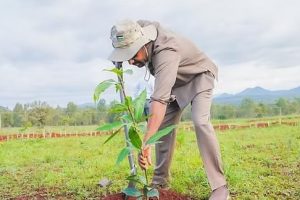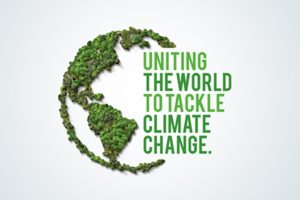
As senior government officials and non-state actors prepare for 2022 Africa Climate Week in Libreville, Gabon (29 August – 2 September) a reflection on Africa’s untapped potential to provide solutions to the global climate crisis, by Ibrahim Thiaw, Acting Executive Secretary of UN Climate change.
Africa has long been tagged as a continent of problems, including problems related to climate change. It is impossible to deny that the continent is facing multiple challenges. However, on climate, it seems Africa has untapped resources. Some opine that the continent can be a source of solutions to the worse environmental crisis the world is faced with.
Indeed, Africa is the continent that has the lowest total greenhouse gas emissions – 7% of the world’s share – and the lowest per capita emissions.
However, analysts point to a paradox which deserves some reflection: How it is possible that up to 45% of Africa’s population has no access to electricity whilst the continent has the world’s largest potential for renewable forms of energy. Deploying the potential of solar, wind, hydro, geothermal energy and the recently discovered huge potential for green hydrogen may be a game changer, not only for the African continent, but for the entire planet.
Furthermore, Africa is known as having the largest reserve of rare earth that is badly needed for “green” technologies. It is therefore undeniable that Africa is part of the global climate solution.
Equally important is the massive potential contribution of ecosystem restoration in mitigating the climate crisis. Given the large land mass and the hundreds of millions of hectares of land that can be restored to health for food production and water conservation, ecosystem restoration will indeed provide multiple solutions to various crises, including drought, poverty, land and biodiversity loss.
Providing energy to farmers and pastoralists is another game changer. This can help reduce food waste, which has a direct positive impact on land use, desertification control and biodiversity conservation.
Given the dynamism of the demography in Africa, it makes sense for the world to not only tap into this potential, but to do it now before the continent’s total population grows to 2 billion people by 2050 and 4 billion by the end of the century. We have a major opportunity at the upcoming UN Climate Change Conference COP27 in Egypt to either invest now or procrastinate with the risk of transforming a long-hanging fruit into a tragedy.
Next week marks the start of Africa Climate Week in Libreville, Gabon, a milestone event on the climate calendar designed to drive regional collaboration, boost climate action and accelerate implementation of the Paris Agreement, with topics ranging from sustainable urbanization to nature-based solutions.
The event will address shared risks and explore the many shared opportunities to tackle climate change. With governments, private sector leaders, development organizations, youth and civil society attending, discussions will advance on implementation of the Paris Agreement at the regional level. Concrete examples of climate action already underway will be showcased to spur even more action.
UN Secretary-General António Guterres has repeatedly pointed out the gap in the commitment of developed countries to deliver on their $100 billion climate commitment annually. At the same time, we need multilateral development banks and the private sector to be fully on board to mobilize the billions of dollars need for climate action, with an increasing focus on adaptation. Public-private partnerships are key, as are ways of identifying innovative means of finance for climate change.
Africa Climate Week is a major opportunity to advance regional action around cutting greenhouse gases, building resilience to the impacts of climate change and mobilizing financial support to help lay the groundwork for an effective outcome of the UN Climate Change Conference COP27 this November in Sharm El- Sheikh, Egypt.
This is a difficult challenge, and it won’t be easy. Despite the geopolitical challenges facing all nations, now is not the time to retreat on the promises of the Paris Agreement and the Glasgow Climate Pact. Now is the time for bold action, strong decisions and accountability. And now is the time to ramp up regional climate action.
Africa Climate Week 2022 will be held from 29 August to 2 September in Libreville, Gabon, hosted by the Government of Gabon. See the detailed programme and register here.
Source:unfcc.int
THE ETHIOPIAN HERALD WEDNESDAY 24 AUGUST 2022





